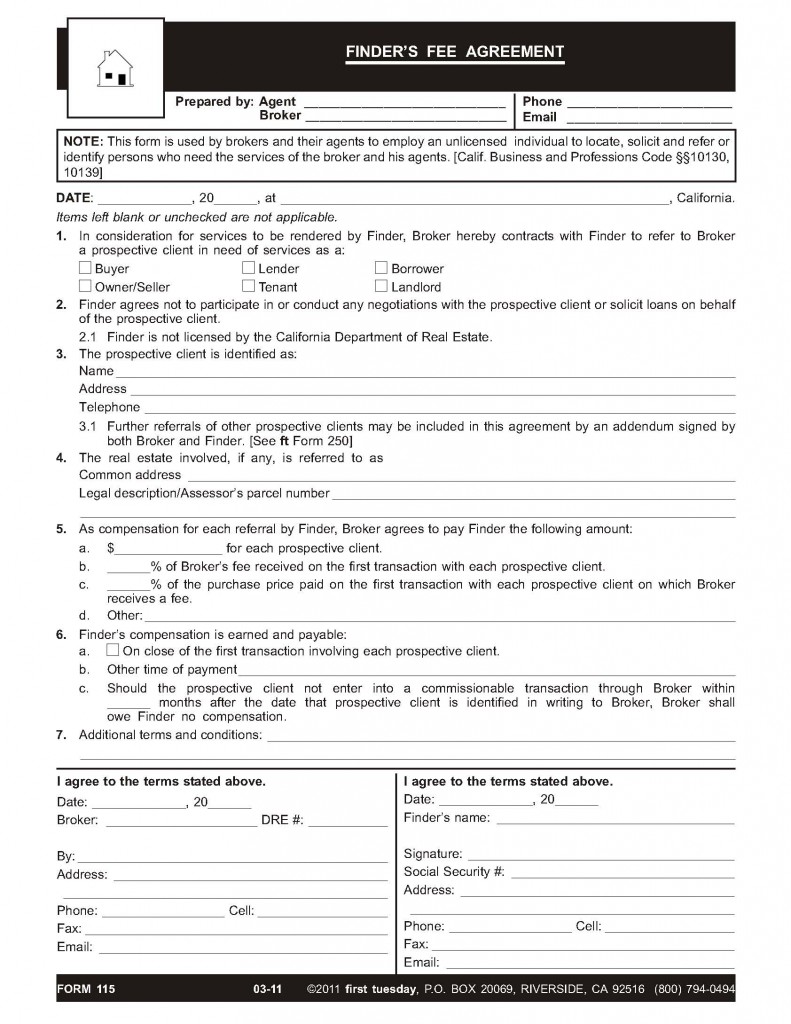Form-of-the-week: Finder’s Fee Agreement – Form 115
Three classes of real estate “agents” have been established in California:
- licensed brokers;
- licensed sales agents; and
- unlicensed finders.
Licensed brokers and sales agents owe fiduciary duties to the principals they represent. Fiduciary duties require licensees to perform on behalf of their client with the utmost care, honesty and diligence.
An unlicensed finder has no such fiduciary duty.
A finder’s function as an “agent” is limited to soliciting, identifying, and referring potential real estate participants to brokers, agents, or principals in exchange for the promise of a fee. They are locators, period.
Related article:
Limitations are placed on the conduct of a finder. A finder lacks legal authority to participate in any aspect of property information dissemination or other transactional negotiations for a fee. [Calif. Business and Professions Code §§10130 et seq.]
An individual who crosses into any aspect of negotiation or providing property information disclosures needs a real estate license as they are both soliciting and negotiating. Unless licensed, an individual who enters into negotiations (supplying property or sales information) cannot collect a fee for services rendered – even if they call it a finder’s fee. [Bus & PC §§10137, 10139]
A finder may be an agent for the broker. The broker may employ a finder to perform services that do not require a license, just as the case with administrative staff. All employees of a broker must be hired under written contracts of employment. Written contracts are entered into to delineate the responsibilities each has undertaken. Thus, the broker limits their conduct to that permitted by regulations for their different licensed or unlicensed status.
However, oral fee agreements between a broker or their agents and a finder are enforceable. Yet, as a matter of prudent practice, a written finder’s fee agreement memorializes the agreement as documentation against memories to the contrary, and more importantly conforms with Bureau of Real Estate (BRE) regulations. [Grant v. Marinell (1980) 112 CA3d 617; see first tuesday Form 115]
The distinction must be made between the sharing of fees – also known as fee-splitting – between brokers and the payment of a finder’s fee to an unlicensed employee of the broker.
When sharing fees with an individual who is not in the employ of the broker, the fee can only be shared with another real estate broker. For a broker to pay a finder’s fee for an unlicensed referral service, the individual must be under contract with the broker as an employee.
first tuesday’s Finder’s Fee Agreement is the employment contract between a broker or their agent and a finder. A finder is entitled to a fee as an unlicensed individual if they solicit, locate, place, introduce, or deliver names of prospective clients to a broker or principal. [Tyrone v. Kelley (1973) 9 C3d 1; see first tuesday Form 115]
The Finder’s Fee Agreement provides for:
- the identity of the prospective client;
- a description of the real estate involved, if applicable;
- the compensation due to the finder; and
- the conditions under which the referral fee is earned by the finder. [See first tuesday Form 115]















